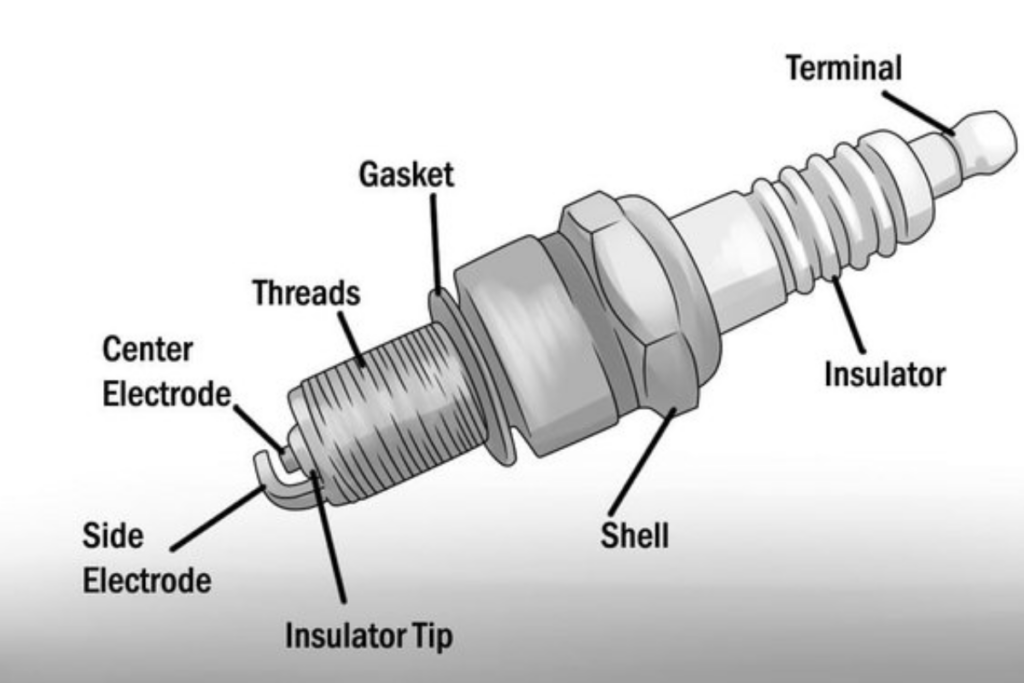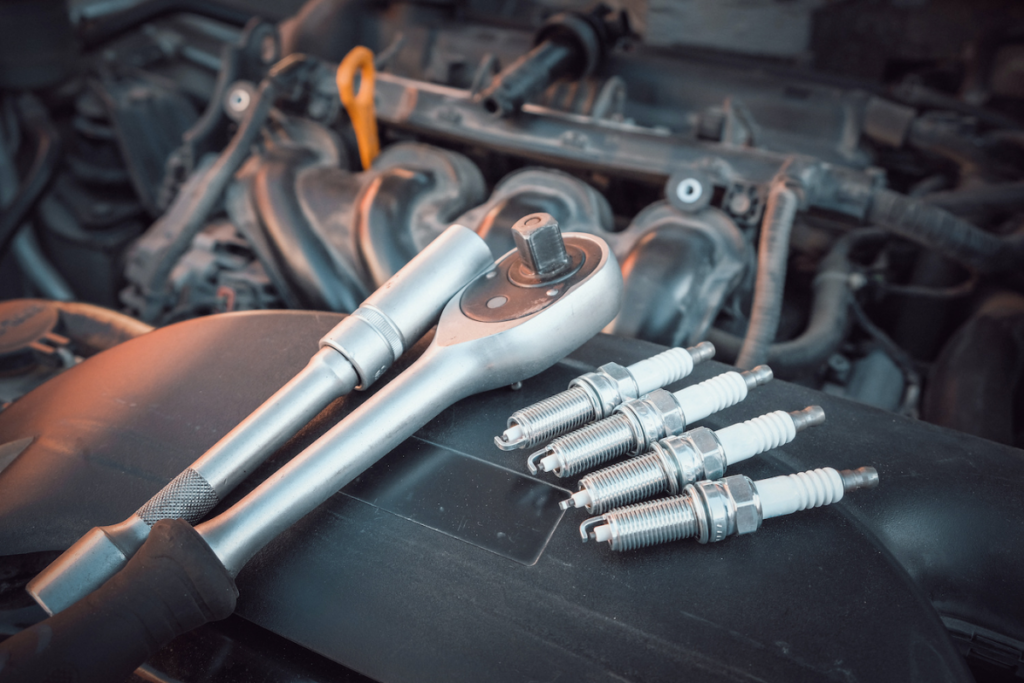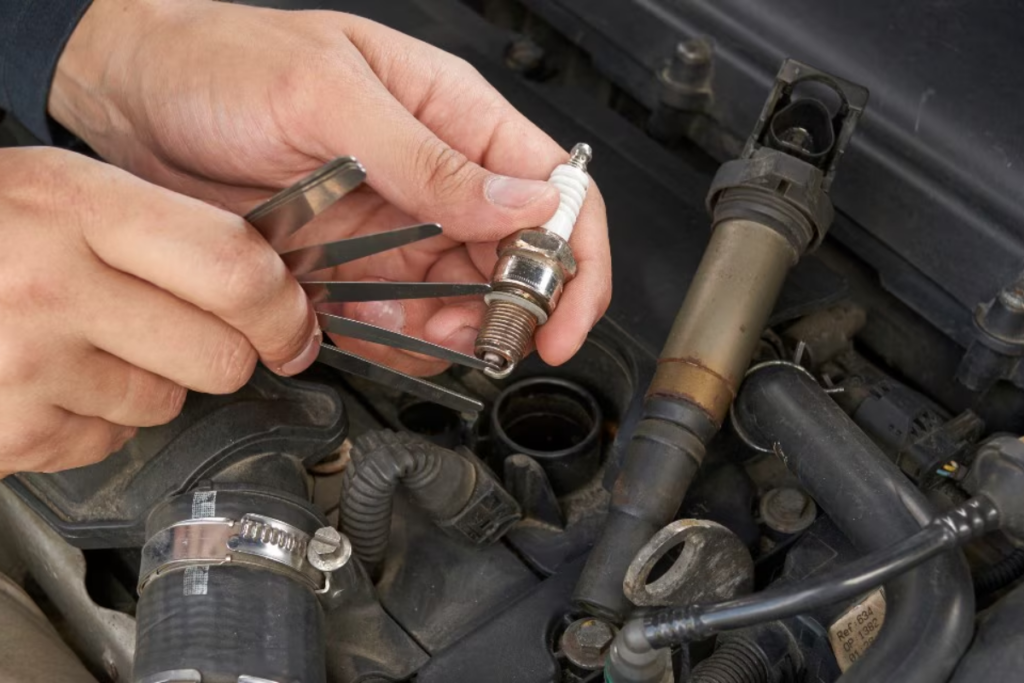📖 Table of Content:
- What Are Spark Plugs and Their Role?
- Factors Affecting Spark Plug Replacement Cost
- Average Cost of Spark Plugs Replacement
- Cost Breakdown by Spark Plug Type
- DIY Spark Plug Replacement: A Cost-Effective Option
- When to Replace Your Spark Plugs
- Additional Costs to Consider
- Tips to Save Money on Spark Plug Replacement
- How Much Does Spark Plug Replacement Cost?
- Frequently Asked Questions (FAQs) About Spark Plug Replacement Cost
- Conclusion
Spark plugs are a vital component of your vehicle’s engine, playing a crucial role in igniting the fuel-air mixture that powers your car. Regular maintenance and timely replacement of spark plugs are essential to keeping your engine running efficiently. Understanding the spark plug replacement cost can help you budget for this maintenance task and potentially save money by making informed decisions. In this guide, we’ll explore the various factors that affect spark plug replacement pricing and provide tips on how to manage these costs effectively.
What Are Spark Plugs and Their Role?
Spark plugs are small but mighty components of your vehicle’s ignition system. They are responsible for creating the spark that ignites the air-fuel mixture in the engine cylinders. This spark initiates combustion, which generates the power needed to start and run your vehicle.
The primary functions of spark plugs include
- Ignition: Providing the necessary spark to ignite the air-fuel mixture.
- Heat Dissipation: Helping to transfer heat away from the combustion chamber.
- Combustion Stability: Ensuring consistent combustion cycles for smooth engine operation.
Maintaining your spark plugs is crucial for several reasons
- Fuel Efficiency: Worn-out or faulty spark plugs can cause incomplete combustion, leading to increased fuel consumption.
- Engine Performance: Good spark plugs ensure smooth and reliable engine performance, reducing the likelihood of misfires and rough idling.
- Reduced Emissions: Properly functioning spark plugs contribute to efficient combustion, which helps reduce harmful emissions from your vehicle.
- Cost Savings: Regular maintenance and timely replacement of spark plugs can prevent more severe engine issues and costly repairs down the line.
Understanding the spark plug replacement cost and the role of spark plugs in your vehicle can help you appreciate the importance of keeping them in optimal condition.
Factors Affecting Spark Plug Replacement Cost
Understanding the factors that influence spark plug replacement cost can help you make informed decisions and manage your budget effectively. Here are the key factors that affect the cost:
1. Types of Spark Plugs
Different types of spark plugs have varying price points. The main types include:
- Copper Spark Plugs: Generally the least expensive, but have a shorter lifespan.
- Platinum Spark Plugs: More durable than copper and moderately priced.
- Iridium Spark Plugs: Offer the best performance and longest lifespan, but are the most expensive.
- Double Platinum and Double Iridium Spark Plugs: Provide extended life and enhanced performance, often at a higher cost.
- Ruthenium Spark Plugs: A newer option, offering high performance at a premium price.
2. Number of Spark Plugs Required
The number of spark plugs your vehicle needs depends on its engine configuration. Most vehicles have one spark plug per cylinder, but some high-performance engines may require two spark plugs per cylinder, doubling the replacement cost.
3. Vehicle Make and Model
The make and model of your vehicle can significantly impact the spark plug replacement pricing. Luxury or high-performance vehicles may require specialized spark plugs that are more expensive. Additionally, the design of the engine bay can affect labor costs, as some vehicles require more time and effort to access the spark plugs.
4. Labor Costs: DIY vs. Professional Service
Labor costs can vary widely based on whether you choose to replace the spark plugs yourself or hire a professional mechanic.
Professional Service: Hiring a mechanic will incur labor charges in addition to the cost of the spark plugs. Labor costs for professional replacement can range from $100 to $250 or more, depending on the complexity of the job and the rates in your area.
DIY Replacement: If you’re comfortable working on your vehicle, doing it yourself can save you the labor costs, which typically range from $50 to $150. You will only need to purchase the spark plugs and any necessary tools.
Average Cost of Spark Plugs Replacement
Knowing the average cost of spark plug replacement can help you budget for this essential maintenance task. The cost can vary widely depending on several factors, including the type of spark plugs, the vehicle make and model, and whether you choose to do it yourself or hire a professional.
National Average Cost Range
- The national average cost for spark plug replacement typically ranges from $100 to $250. This range accounts for both parts and labor.
Breakdown of Parts and Labor Costs
- Parts Cost: Spark plugs themselves are relatively inexpensive, with prices ranging from $3 to $20 each, depending on the type and quality. High-performance or extended-life spark plugs, such as those made of iridium or platinum, tend to be on the higher end of this price range.
- Labor Cost: Labor costs for spark plug replacement can vary significantly. If you hire a professional mechanic, you can expect to pay between $50 and $150 for labor. The total labor cost depends on the complexity of the replacement process, which can be more challenging for some vehicle models.
Comparison of Costs for Different Vehicle Types
Luxury and Performance Vehicles: Replacing spark plugs in luxury or high-performance vehicles can be the most expensive, often exceeding $250. These vehicles may require specialized spark plugs and more labor-intensive procedures.
Compact Cars: Replacing spark plugs in compact cars typically costs between $100 and $150, with lower labor costs due to easier access to the engine.
SUVs and Trucks: For larger vehicles like SUVs and trucks, the cost can be higher, ranging from $150 to $250. This is due to more complicated engine layouts and the need for more labor.
Cost Breakdown by Spark Plug Type
When considering the spark plug replacement cost, it’s essential to understand the different types of spark plugs available and how their prices vary. Below is a breakdown of the costs associated with each type of spark plug:
Copper Spark Plugs
Copper spark plugs are the most affordable option, typically costing between $3 and $10 each. They provide good performance but have a shorter lifespan compared to other types. Due to their lower durability, copper spark plugs are usually recommended for older vehicles or those with lower mileage requirements.
Platinum Spark Plugs
Platinum spark plugs are a step up from copper in terms of longevity and performance. They generally cost between $10 and $20 each. The platinum tip allows them to last longer, often up to 60,000 miles, making them a more cost-effective option over time.
Double Platinum Spark Plugs
Double platinum spark plugs feature platinum on both the center and ground electrodes, enhancing their durability and performance. These spark plugs typically cost between $15 and $25 each. They are ideal for vehicles with a waste spark ignition system, where spark plugs fire twice as often.
Iridium Spark Plugs
Iridium spark plugs are known for their superior performance and longevity. They usually cost between $20 and $30 each. The iridium tip is extremely durable, allowing these spark plugs to last up to 100,000 miles. They are a popular choice for modern vehicles with high-performance engines.
Double Iridium Spark Plugs
Double iridium spark plugs offer even greater durability and performance, with iridium on both the center and ground electrodes. They generally cost between $25 and $40 each. These spark plugs provide excellent ignition and can last up to 120,000 miles, making them a premium option for high-end vehicles.
Ruthenium Spark Plugs
Ruthenium spark plugs are among the newest and most advanced types on the market. They typically cost between $25 and $45 each. Ruthenium provides exceptional durability and performance, with a lifespan that can exceed 120,000 miles. These spark plugs are designed for the latest high-performance engines and offer the best in terms of efficiency and longevity.
Understanding the differences in spark plug replacement pricing based on the type of spark plug can help you make an informed decision that balances performance and cost-effectiveness for your vehicle.
DIY Spark Plug Replacement: A Cost-Effective Option
Replacing spark plugs yourself can be a cost-effective way to maintain your vehicle’s performance and save money on labor costs. Here’s a step-by-step guide to help you through the process.
Step-by-Step Guide to Replacing Spark Plugs Yourself
Gather Tools and Parts Needed
New spark plugs (make sure they are compatible with your vehicle)
Spark plug socket
Ratchet wrench
Extension bar (if necessary)
Torque wrench
Spark plug gap tool
Anti-seize compound (optional)
Dielectric grease (optional)
Prepare Your Vehicle
Ensure your engine is cool to prevent burns.
Disconnect the negative terminal of the battery to avoid any electrical issues.
Remove any components obstructing access to the spark plugs (such as engine covers or air intake tubes).
Remove the Old Spark Plugs
Locate the spark plugs (usually found along the top or side of the engine).
Carefully remove the spark plug wires or ignition coils (label them if necessary to ensure correct reinstallation).
Use the spark plug socket and ratchet wrench to loosen and remove each spark plug.
Inspect and Gap the New Spark Plugs
Check the gap on the new spark plugs using a spark plug gap tool. Adjust the gap if necessary according to your vehicle’s specifications.
Apply a small amount of anti-seize compound to the threads of the new spark plugs (optional).
Install the New Spark Plugs
Carefully thread the new spark plugs into the engine by hand to avoid cross-threading.
Tighten the spark plugs using a torque wrench to the specified torque setting.
Reinstall Components
Reattach the spark plug wires or ignition coils, ensuring they are connected to the correct spark plugs.
Reinstall any components that were removed to access the spark plugs.
Reconnect the negative terminal of the battery.
Test Your Vehicle
Start the engine and listen for any unusual noises.
Take your vehicle for a short test drive to ensure everything is functioning properly.
Potential Savings from DIY Replacement
By replacing spark plugs yourself, you can save significantly on labor costs. Professional spark plug replacement can range from $100 to $250, including labor, while the cost of spark plugs alone ranges from $16 to $100 depending on the type and number of plugs needed. DIY spark plug replacement can reduce your expenses to just the cost of the parts, offering substantial savings.
When to Replace Your Spark Plugs
Signs of Worn-Out Spark Plugs
Knowing the signs of worn-out spark plugs can help you determine when it’s time for replacement. Look out for these indicators:
- Difficulty Starting: If your engine struggles to start, especially in cold weather, worn-out spark plugs could be the culprit.
- Poor Fuel Efficiency: Worn spark plugs can lead to incomplete combustion, causing your vehicle to burn more fuel than usual.
- Engine Misfires: A rough, shaky engine or misfires during acceleration are common signs of spark plug wear.
- Rough Idling: If your engine idles roughly or inconsistently, it could be due to worn spark plugs.
- Lack of Acceleration: You may notice a decrease in engine power and sluggish acceleration when spark plugs are worn out.
Recommended Spark Plug Replacement Cost Intervals
The replacement interval for spark plugs varies depending on the type:
- Traditional Spark Plugs: Typically need replacement every 30,000 to 50,000 miles.
- Extended-Life Spark Plugs: Can last up to 100,000 miles before replacement, as they are designed for longer durability.
It’s essential to check your vehicle’s owner’s manual for manufacturer recommendations specific to your make and model. Following the recommended intervals ensures optimal engine performance and efficiency.
Importance of Following the Vehicle’s Maintenance Schedule
Regular maintenance, including spark plug replacement, is crucial for the longevity and reliability of your vehicle. Ignoring scheduled maintenance can lead to costly repairs and decreased fuel efficiency. By following your vehicle’s maintenance schedule, you can prevent potential issues and keep your engine running smoothly.
Additional Costs to Consider
When budgeting for spark plug replacement, it’s essential to factor in additional costs that may arise during the service. These costs can vary based on your vehicle’s condition and specific maintenance needs:
Spark Plug Wires Replacement
Alongside replacing spark plugs, it’s often recommended to replace spark plug wires. Over time, these wires can wear out, affecting the efficiency of your engine’s ignition system. The cost for spark plug wires typically ranges from $20 to $100, depending on the make and model of your vehicle.
Associated Repairs
During a spark plug replacement service, other related repairs may also be necessary depending on your vehicle’s maintenance schedule and condition:
- O2 Sensor Replacement: If your oxygen sensors are nearing the end of their lifespan or showing signs of malfunction, replacing them during the spark plug service can cost between $100 and $300 per sensor.
- Fuel Filter Replacement: A clogged or worn-out fuel filter can impact engine performance and fuel efficiency. Replacement costs for fuel filters vary but generally range from $50 to $150, depending on the vehicle type.
Tax and Additional Fees
When visiting a mechanic or purchasing parts for DIY replacement, keep in mind that tax and additional fees may apply. These can include shop fees, disposal fees for old parts, and sales tax, which can add a few extra dollars to your overall cost.
Tips to Save Money on Spark Plug Replacement
Replacing spark plugs doesn’t have to break the bank. Here are some practical tips to help you save money on spark plug replacement costs:
Choosing the Right Type of Spark Plugs for Your Vehicle
The type of spark plugs you choose can significantly impact the overall cost of replacement. Here are some common types and their characteristics:
- Copper Spark Plugs: Generally the least expensive option but may need more frequent replacement.
- Platinum and Iridium Spark Plugs: More durable and have a longer lifespan than copper plugs, though they can be more costly upfront.
Consult your vehicle’s owner manual or a trusted mechanic to determine the best spark plug type for your specific make and model. Opting for a durable option like iridium plugs might cost more initially but can save you money in the long run by extending replacement intervals.
Comparing Prices from Different Auto Shops and Online Stores
Don’t settle for the first quote you receive. Prices for spark plugs and replacement services can vary between auto shops and online retailers. Take the time to shop around and compare prices. Websites like AutoZone, Amazon, and local auto parts stores often offer competitive pricing.
Using Coupons and Discounts
Many auto shops and online retailers offer coupons and discounts that can help reduce the cost of spark plug replacement. Before making a purchase, check for available coupons or promotional codes. Signing up for newsletters or loyalty programs from auto parts stores can also provide access to exclusive discounts.
How Much Does Spark Plug Replacement Cost?
The cost of replacing spark plugs can vary based on several factors, including the type of spark plugs required, the number needed for your vehicle, and whether you choose to do it yourself or rely on professional service. Here’s a breakdown of what you can expect:
Average Cost Range: The national average cost to replace spark plugs typically ranges from $16 to $100 for parts alone. Labor costs, if you opt for professional service, can add anywhere from $50 to $150 or more, depending on the complexity of the job and local labor rates.
Frequently Asked Questions (FAQs) About Spark Plug Replacement Cost
How much does it cost to replace spark plugs?
The cost to replace spark plugs can vary depending on several factors such as the type of spark plugs (copper, platinum, iridium), the number of spark plugs required by your vehicle, and whether you opt for professional installation or choose to replace them yourself. On average, you can expect to pay between $16 and $100 for a set of spark plugs. Professional installation typically adds labor costs, bringing the total to approximately $100 to $250.
How often should spark plugs be replaced?
The frequency of spark plug replacement depends on the type of spark plugs installed in your vehicle. Traditional copper spark plugs typically need to be replaced every 20,000 to 30,000 miles, while platinum or iridium spark plugs can last up to 60,000 to 100,000 miles. Refer to your vehicle’s owner manual for the manufacturer’s recommended replacement interval.
Can I replace spark plugs myself?
Yes, replacing spark plugs is a relatively straightforward task that many vehicle owners can do themselves. It requires basic tools and following a step-by-step guide. By replacing spark plugs yourself, you can save on labor costs, which often make up a significant portion of the total replacement cost.
What are the symptoms of bad spark plugs?
Common symptoms of worn-out or faulty spark plugs include:
- Difficulty starting your vehicle, especially in cold weather
- Engine misfires or hesitation during acceleration
- Rough idling or a noticeable drop in engine performance
- Increased fuel consumption
- Engine surging or vibrating
If you notice any of these signs, it’s advisable to have your spark plugs inspected and replaced if necessary.
Do I need to replace spark plug wires at the same time?
It’s generally recommended to replace spark plug wires when you change your spark plugs. Over time, spark plug wires can wear out and develop cracks or breaks, which can lead to poor engine performance. Replacing them along with the spark plugs ensures optimal ignition and extends the lifespan of your engine components.
How much should it cost to replace spark plugs?
The cost of replacing spark plugs varies widely depending on factors like the type of plugs and labor costs. For a basic replacement job, expect to spend between $16 and $100 for the spark plugs alone. Professional installation typically adds $50 to $150 in labor costs, resulting in a total cost of approximately $100 to $250.
What are the symptoms of a bad spark plug?
Signs of a bad spark plug include:
- Difficulty starting the engine
- Engine misfires or hesitation
- Reduced fuel efficiency
- Rough idling or engine vibrations
- Increased exhaust emissions
Addressing these symptoms promptly can prevent more severe engine issues and improve overall vehicle performance.
How long will spark plugs last?
The lifespan of spark plugs varies depending on the type. Traditional copper spark plugs typically last around 20,000 to 30,000 miles. Platinum and iridium spark plugs have a longer lifespan, ranging from 60,000 to 100,000 miles. Refer to your vehicle’s maintenance schedule to determine the recommended replacement interval for your specific spark plugs.
Conclusion
In conclusion, understanding the cost of spark plug replacement is crucial for every vehicle owner. By now, you’ve learned about the factors influencing spark plugs replacement costs, including the type of spark plugs, labor expenses, and additional repairs that may be needed. Whether you choose to replace spark plugs yourself or seek professional service, being informed can help you make the best decision for your vehicle and budget.
Regular maintenance of spark plugs not only saves you money in the long run but also ensures optimal vehicle performance. By following your vehicle manufacturer’s recommended maintenance schedule and addressing any signs of worn-out spark plugs promptly, you can maintain fuel efficiency, engine reliability, and overall vehicle longevity.
Remember, your car’s engine deserves the best care possible, and spark plug replacement is a critical part of that care routine. Stay proactive, stay informed, and enjoy a smoother ride for miles to come.




